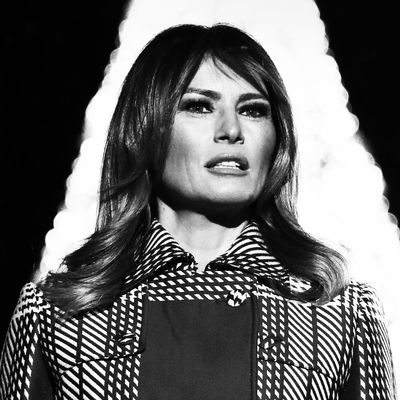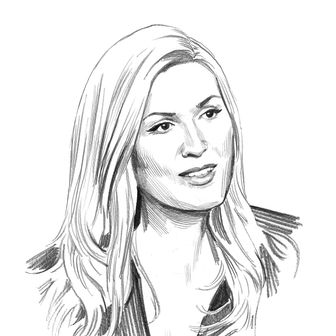
I’d never been on Executive Foxtrot One, the presidential aircraft used to transport members of the First Family, when I ascended its red-carpeted stairs and boarded the cabin last spring to travel to a Nashville children’s hospital with Melania Trump. But thankfully, I was seated near Kate Bennett, a frequent Foxtrot flier and correspondent for CNN.
Bennett is maternal and glamorous and cool, and I relied on her, asking her how things worked here and why they work this way and collecting from her the kind of precious details you can only get when you are physically there all the time, when you are so close to the story you’re covering that you know, as Bennett knows, how the story smells. (Melania Trump smells distinct, like jasmine and cinnamon, which Bennett suspects is a custom blend.) Bennett seemed to know it all.
Bennett has put her institutional knowledge and her juiciest observations into her new book, Free, Melania, published earlier this month. I invited her over to my house to talk about the peculiarities of her job, and the woman she covers.
First of all, we need to talk about the comma. Free, Melania — what is that?
[Laughs.] It’s just a play on the original hashtag, which was #FreeMelania, in which she was trapped and tapping Morse code on the windows, like, “Save me!”
Yeah, is that true?
It’s not true.
Shit.
I know. In my covering her for three years, I found sort of the opposite to be true, and that’s why the comma is there. I think she’s probably the most free person in the Trump world. In terms of whether you like it or not, she does whatever she wants, whether you agree with it or not. She doesn’t really have a platform. She doesn’t really do events. She doesn’t have to campaign if she doesn’t want to. Do you know what I mean? She’s literally probably the most free modern First Lady that we’ve seen.
In the book, I felt a tension between your desire to be sympathetic to her, and your requirement to cover her aggressively and fairly. Anyone we cover for a long time, who we think about constantly, we’re going to develop empathy for — it would be sociopathic not to. But how do you navigate feeling for her as a human being while maintaining enough distance to perform your job?
I thought a lot about this, because I don’t think I’m sympathetic to her. I think what I try to do is look at her on the spectrum, like, she’s married to a man who puts kids in cages, and that’s horrible. And she’s also a woman who is a real person and who, outside of this realm, everyone says lovely things about. And somewhere in there is the story I have to tell.
I think what I found is that, in truth, she’s more in the human realm than the realm that we see or associate her with, by which I mean the unsmiling, sunglasses, married to Donald Trump, quiet — it looks like she’s judging, the squinty sort of judgment face. What I found covering her is that she’s less like that than we might think. I want to tell people about that, but not in a way that’s like, “Come on guys, give her a chance!” I’m more like, Let’s think about her this way.
It’s interesting, because I view my job, in part, as an attempt to humanize my subjects. And that’s not a very popular thing to do right now, in this political environment. I hear often from the left, that they think taking the time to understand the people with whom they disagree, who they think are evil, is not only not a worthwhile endeavor, but is actively harmful, is somehow a form of complicity. But your job, too, is about humanization, in a way. You’re assigned to humanize, at as granular a level as possible, this one extraordinarily visible and confounding person. What do you think of the pervasive attitude that’s like, Fuck her, we don’t care.
I mean, I understand it, I guess. My job requires that I block that part out. As a former features writer, I think of her and I think of covering her as like a long feature piece. She’s not moving the needle on policy or politics necessarily, even though she is influential to the president. She’s not dabbling in, you know, criminal mischief …
That we know of.
That we know of! [Laughs.] But she’s a person. And I try to portray her as such. People say, Oh, you’re normalizing them — like it’s a bad thing! And I’m like, in a way I am, and I’m sort of okay with that. She’s going to go down in history books, whether people want to acknowledge that or not. She will be part of this chapter of American history.
What was the central question you were hoping to answer with the book?
The short answer is for the people who are always like, What’s she like? What is she really like? Is she really sad? Is she really bummed out? Is she, like, living somewhere else in a different house? We’re three years into this administration and people still have so many questions, just basic questions. Is she nice? Does she talk to you? That’s kind of what I want people to take away from the book, just a better understanding of who she is.
The other question I get a lot of is, What does she do all day? And sometimes I ask myself that, too, like, What does she do all day?
Well, what does she do?
It’s very much a work schedule. But it might be work, like, Let’s pick the guest list for the next luncheon. Or, Oh, we have to go over the wreaths.
I think that sounds really nice and I wish that that was my life.
It is, essentially, a wealthy woman’s life, and that is basically what she was: a wealthy, stay-at-home mom with three homes. And thinking about, Oh God, it’s already August we have to start thinking about the Thanksgiving table arrangements. For her that’s a very real work day.
You’re continuing to cover Melania Trump after this book. When you have a beat, you have to go back to the same well over and over again — it can be very tricky to navigate. So I guess my question is, did you pull any punches?
I don’t think I pulled any punches. There are certainly things that I know about that would have made for really juicy stuff for the book — and I hate to be a tease. But because of those relationships and because her world is so small, and she does that by design, she will know who told me what. And so, I don’t nor can I really in good faith destroy someone’s life or friendship or job just because I want to. That wasn’t my onus with this book. But something I’ve been dealing with that even before the book is that she has, like, three people around her. So how am I going to do this and how am I going to do it fairly? That’s always been a fear, like, I still have to show up the next day.
Right. It’s not like in the West Wing where there are like 80 people who could be leaking to you.
Totally. It’s totally not like that. And also, along the same lines, thousands of people have met Donald Trump or interacted with him in his 30 or 40 years in the public eye. Melania is not social. She doesn’t have a girl posse. It’s not just her staff that’s a small group, it’s her friends, too. It’s not a deep well. So it is a very tricky beat. Even last week, a source told me that the East Wing was upset about my coverage of her getting booed in Baltimore. And I’m like, “the East Wing,” means Melania.
Are they mad about the book?
I don’t think that they’re happy about the book, but I knew she wouldn’t be, because she thinks everybody is out to make a dime from her. But I do think it’s a fair portrayal of her. I think it’s meaner to him and sort of shows that he’s a doofus.
This conversation has been edited for clarity and length.


